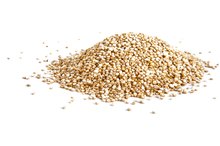What Organ Breaks Down Protein for the Body?
Your body needs protein to repair and build cells. Protein releases amino acids during digestion. The amino acids aid in growth and development, provide your body with energy and manufacture neurotransmitters to improve moods. It takes the work of several organs to break down proteins. The breakdown of protein during the digestive process involves the stomach and the small intestine. The liver, pancreas and gallbladder also play roles in the digestive system.
Begins in the Stomach
Protein comes from foods such as meat, poultry, fish and dairy products. Digestion of protein begins in the stomach after food has traveled from the esophagus. Tiny glands in the mucosa of the stomach produce juices to help digest food, according to the National Digestive Diseases Information Clearinghouse. An enzyme in the juice of the stomach begins to digest protein.
Molecules to Amino Acids
Steps of Food Digestion
Learn More
Several enzymes in the small intestine then continue the breakdown of protein, turning protein molecules into amino acids. The small intestine gets digestive juices from the liver and pancreas that reach the intestine from ducts. The gallbladder stores the juices until needed by the intestine. The amino acids absorb through the small intestine into the blood and are then carried throughout other areas of the body.
Fats and Cholesterol
After the amino acids penetrate the intestinal lining, they enter the bloodstream through tiny veins, or capillaries. The acids are then transported to tissues and cells that need to be manufactured or repaired. Fats from protein break down into fatty acids and cholesterol, which become stored or used for cell production and other functions of the body. Your body needs cholesterol for these functions. When you consume an excess amount of foods high in saturated fat, this can result in high cholesterol that can clog your arteries and lead to heart disease.
Essential Amino Acids
How Are Nutrients Absorbed in the Body by the Stomach?
Learn More
Your body needs the amino acids from protein for growth, development and repair of cells and tissues. You need to get essential amino acids from food because your body cannot make them, according to the University of Maryland Medical Center. Essential amino acids include tryptophan, lysine, phenylalanine and others, which help boost energy and mental alertness. Nonessential amino acids, such as asparagines and glutamic acid, are produced by the body, sometimes with the help of essential amino acids. You need a balance of amino acids from your meals throughout the day. Protein foods during breakfast and lunch often provide energy and mental improvement for your day’s activities.
Related Articles
References
Writer Bio
Jerry Shaw writes for Spice Marketing and LinkBlaze Marketing. His articles have appeared in Gannett and American Media Inc. publications. He is the author of "The Complete Guide to Trust and Estate Management" from Atlantic Publishing.









